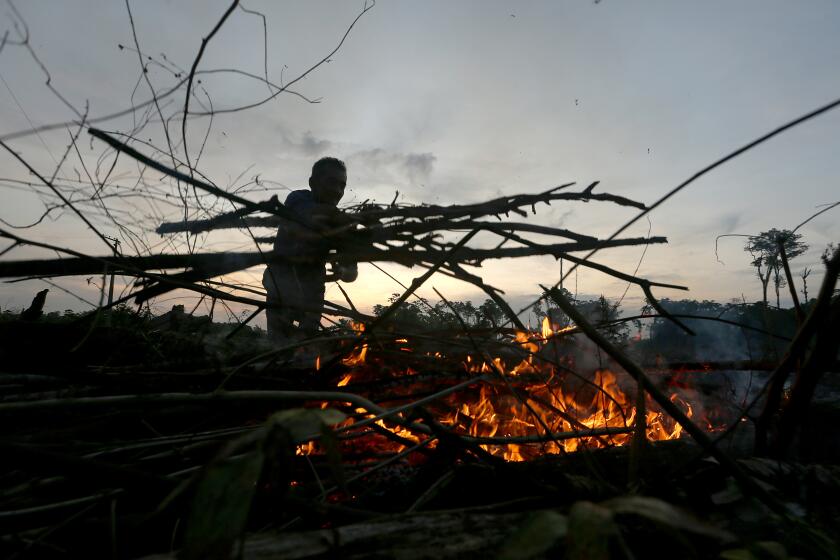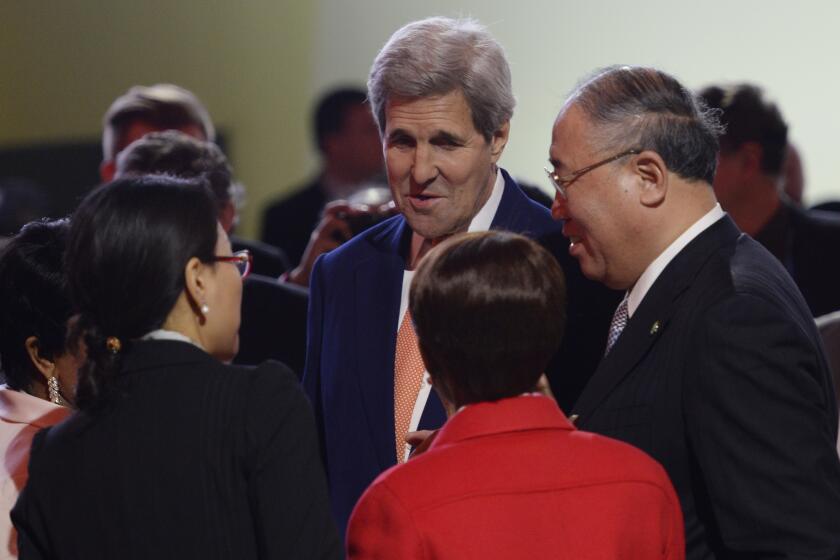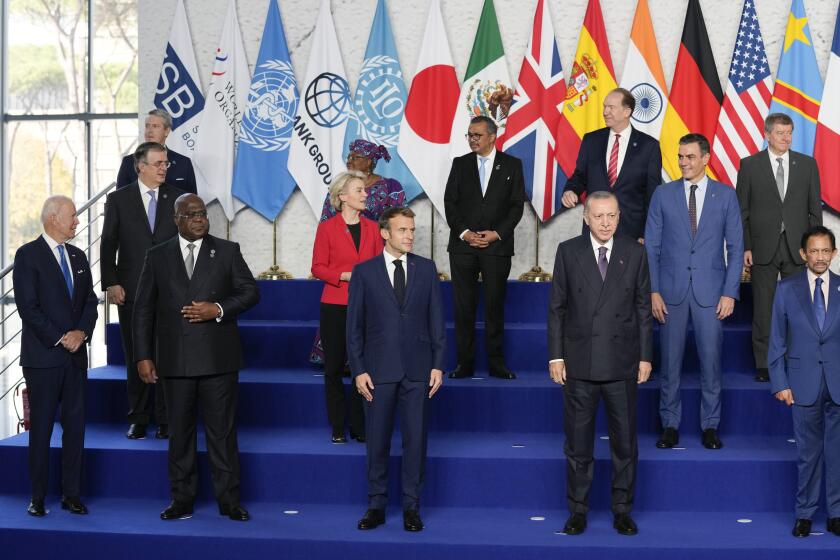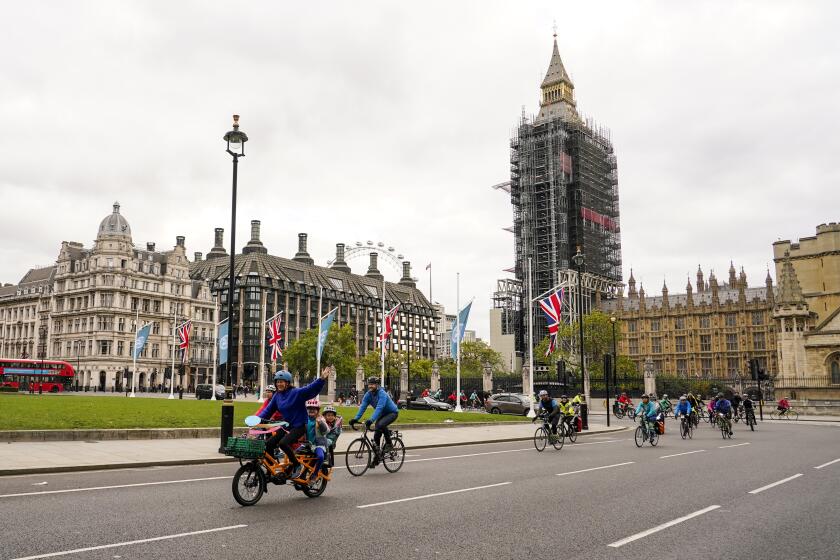Biden urges action at U.N. climate summit but without legislative victory back home

President Biden addressed the COP26 climate conference in Glasgow, Scotland, on Monday, where he said the U.S. would announce new initiatives “over the next seven days” to combat climate change.
GLASGOW, Scotland — Calling this “the decisive decade,” President Biden assured world leaders at the United Nations climate summit Monday that the United States will pass legislation to cut emissions and make unprecedented investments in clean energy, despite political tension within his own party that has made progress difficult.
“Climate change is already ravaging the world,” the president said, pointing to increasingly frequent and severe heat waves, droughts, wildfires and floods that have cost the U.S. and other countries trillions of dollars and led to crop failures and starvation. He called on other nations to increase their climate goals, even as rising prices for coal, oil and natural gas — and the resulting political instability — have complicated or even delayed their transitions to cleaner fuel.
Heads of state, environmental activists, business leaders and journalists are in Scotland for a climate summit that comes as world leaders are running out of time to break away from fossil fuels and prevent the most catastrophic effects of global warming.
“Will we act? Will we do what is necessary? Will we seize the enormous opportunity before us or will we condemn future generations to suffer?” Biden said. “This is the decade that will determine the answer.”
Biden’s speech was short — though it still went over the limit by eight minutes — and conciliatory.
Drawing a stark contrast between his views and those of his predecessor, he offered world leaders a renewed sense of optimism that the U.S. would try to make up for the four years of Donald Trump’s presidency, during which America quit the 2015 Paris climate agreement and blocked a measure that would have encouraged all countries to increase their climate goals.
“We’ll demonstrate to the world the U.S. is not only back at the table, but hopefully leading by the power of our example,” the president said at the summit. “I know it hasn’t been the case, and that’s why my administration is working overtime to show that our climate commitment is action, not words.”
Later, during a smaller meeting with other world leaders, he apologized for Trump’s decision to abandon the international agreement, saying it put the U.S. “behind the eight ball a little bit.”
Thom Woodroofe, a fellow at the Asia Society Policy Institute and former climate diplomat, said Biden “struck exactly the right humble tone.”
“He clearly knows that while the U.S. might now be back at the table in a very big way, for a lot of countries it is hard to forget the damage done by the Trump administration to the international climate fight,” he said.
Biden’s speech sought to bolster other leaders’ climate ambitions at a time when expectations for the summit are low, despite scientists’ warning that the world is dangerously overheating.
Congress’ failure to pass significant climate legislation before the summit got underway has left the president in a weaker negotiating position than the White House had hoped. Major emitters like China, India and Russia have balked at setting more ambitious goals to slash carbon emissions. And a meeting of the Group of 20 in Rome ended Sunday with an agreement that critics said fell far short of meaningful action to curb rising temperatures.
The rest of the world may suffer the consequences if the U.S. and China don’t work together on reducing greenhouse gas emissions.
As a reminder of the challenges Biden faces, Sen. Joe Manchin III (D-W.Va.), a key swing vote, held a news conference Monday to say his support for Biden’s legislative agenda is still in doubt. Administration officials quickly followed it with a statement saying they believe Biden’s revised proposal will earn Manchin’s support. House Democrats said they plan to push forward with votes on the legislation this week.
Speaking Monday during the summit’s opening ceremony, António Guterres, the U.N. secretary-general, cautioned that recent announcements from the top polluting countries might incorrectly give the impression that the world is on track to prevent the worst effects of climate change.
“This is an illusion,” he said. “Even if the recent pledges were clear and credible, and there are serious questions about some of them, we are still careening towards climate catastrophe.”
Prime Minister Boris Johnson of Britain compared the fight against climate change to a James Bond movie in which the hero works feverishly to disarm a bomb while a clock counts down to oblivion.
“We are in roughly the same position” as Bond, Johnson said. “Humanity has long since run down the clock on climate change,” he said. Johnson later said that future generations and “those billions of beady eyes watching us around the world” would not forgive leaders who failed to act. “They will know that Glasgow was the historic turning point when history failed to turn.”
If all goes better than the event’s organizers and international leaders expect, the summit in Glasgow could set the course for global action to combat climate change.
The G-20 summit struggled to make progress on key issues. Biden blames the absences of Russia and China for the inaction.
The event is intended to be an update to the 2015 Paris climate agreement, when 195 international leaders committed to holding rising temperatures to 1.5 degrees Celsius (2.7 degrees Fahrenheit) above pre-industrial levels. Beyond that threshold, scientists say heat waves, floods, crop failures and wildfires will become increasingly common and deadly.
Leaders were meant to come to the summit with new, more ambitious climate targets that change the world’s current trajectory, which is heading toward roughly 3 degrees Celsius of warming by 2100.
Wealthy countries are also facing pressure from developing nations to fulfill a promise they made back in 2009, when the United States and others agreed that by 2020 they would provide $100 billion a year to help poor countries reduce their carbon emissions, adopt cleaner sources of fuel and adapt to the effects of climate change. So far, the wealthy countries have fallen short, and the latest estimate suggests they might not come up with the full amount until 2023.
In his speech, Biden said the U.S. would do its part. “We want to do more to help countries around the world, especially developing countries” transition away from fossil fuels, he said, adding that he would work with Congress to significantly increase financial support for poor countries by 2024.
Thousands will attend the U.N. global climate summit. While hopes for a major breakthrough are slim, here’s what leaders hope to get done.
The president was more pointed in his remarks on Sunday. Following the conclusion of the G-20 summit, he called the group’s agreement “disappointing” and placed the blame on China and Russia, saying the two countries “didn’t show up in terms of any commitments to deal with climate change.”
Asked whether the U.S. and China’s strained relationship was impeding climate progress, national security advisor Jake Sullivan said the situation is “deeply asymmetrical.”
Speaking to reporters on Air Force One as the president flew from Rome to Scotland on Monday morning, Sullivan said the U.S. had increased its climate goals “despite whatever difficulties we have with China.”
“We’re fulfilling our end of the bargain at COP,” Sullivan said. China is “a big country with a lot of resources and a lot of capabilities, and they are perfectly well capable of living up to their responsibility. It’s up to them to do so.”
On the streets outside the conference, Swedish climate activist Greta Thunberg and other young advocates rallied Monday to protest global leaders’ failure to cut emissions.
“We’re tired of dying. We’re tired of flooding. We’re tired of seeing injustice everywhere we go,” said Jerome Foster II, a 19-year-old climate activist from New York who was named in March to the White House Environmental Justice Advisory Council. Foster said he is frustrated with climate campaigns that target individuals instead of corporations and world leaders, adding, “It’s time for politicians to either step up or step down.”
Before the conference, Thunberg helped start a petition that called on heads of government to divest from fossil fuels. By Monday afternoon, it had more than a million signatures.
Once Biden and the other heads of government leave Tuesday, diplomats and delegates will set to work on negotiations on a hoped-for agreement that lays out how the world will limit warming to 1.5 degrees Celsius. They will also try to settle disputes over financial assistance and attempt to finalize a set of rules for how countries report and claim credit for greenhouse gas emissions reductions.
What they accomplish, or don’t, over the 12-day conference will be a sign of whether the unity and common resolve on display in Paris can be revived.
Times staff writer Megerian reported from Glasgow and staff writers Phillips and Logan from Washington.
More to Read
Get the L.A. Times Politics newsletter
Deeply reported insights into legislation, politics and policy from Sacramento, Washington and beyond. In your inbox three times per week.
You may occasionally receive promotional content from the Los Angeles Times.

















